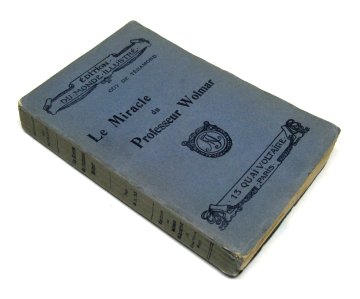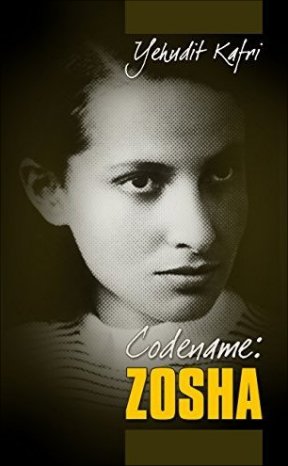|
Experiments in Booksellingby Craig Stark 7 April 2017 |
Le Miracle du Professeur Wolmar
When purchasing inventory, no matter what venue it happens in, there is always risk. The best we can do, it seems, is to make educated guesses on what will sell for a profit and hope to be right
most of the time. Having access to historical pricing obviously lessens the risk, but collector interest - for that matter, institutional interest - can change at any time, and even what happened
yesterday is no guarantee of what will happen again. But there are times when, if you're like me, you take what in gambling parlance is called a flyer. A flyer goes beyond educated guessing and is
perhaps better characterized as wild guessing. I like to think that I'm better at this sort of thing now than I once was, if for no other reason than experience seems to enhance my instincts -
and taking a flyer on something is almost purely instinctive, if not totally so.
I recently took a flyer on a book that I doubt one person in a million has ever heard of - Le Miracle du Professeur Wolmar. The text is in French, and the author, Francois-Edmond Gautier de Teramond
(pseud. Guy de Teramond), though prolific as a poet, dramatist and popular novelist, is not known for his Science Fiction - which this novel is - nor did he write much of it. The plot is somewhat
far-fetched: The protagonist is a noted professor who discovers, among other elusive things, the secret of perpetual motion and sets out to straighten the axis of the Earth so as to produce a
perpetual Spring.
One thing can be said about this book upfront: It's darn scarce. It was issued in gray wraps in 1910 in a presumably small print run and never reprinted. I say "presumably" because WorldCat presently
shows only six print copies held by libraries, all in Europe, and if there exists some record of a sale ever happening on any venue, I couldn't find it.
Now, the reason I purchased it had nothing to do with its being collectible on the basis of its author, genre - or anything we usually purchase inventory for. However, it did have everything to
do with a WWII documentary that, by chance, I saw one day some months ago.
Some background: In the early 1940's, shortly before and after Hitler attacked Russia, an underground, communist organization called the Red Orchestra gathered intelligence for the Russian cause.
Some of this intelligence was delivered by couriers, but some of it was transmitted directly to Russia by radio at great risk to those involved in its transmission.
Part of the Red Orchestra operation was based in Brussels, and the transmission team was housed in a quiet residential area. Technology was such at the time that a transmitter could be operated for
about half an hour without risking detection. But so valuable and voluminous was the intelligence that Russia was receiving that Stalin demanded at least five hours of transmissions nightly, despite
knowing that it was near suicidal. Translation: The team was expendable; people could be replaced. The irony of this was that, though the Germans were intercepting every transmission that was sent,
they failed at every attempt to crack the code.
Central to the Brussels team was a beautiful young woman who served as its encipherer - that is, she converted the raw intelligence into code before it was sent. At the time, for security reasons,
she was the only one who knew the code. By all accounts she was both fiercely brave and steadfastly loyal to the communistic ideal. She went by various names, as so many in covert operations do, but
was best known as Zosha Poznanska. This is her biography:
And here is an excerpt from it:
"Zosha sat hunched over the big table in the middle room of her apartment, her elbow propped on the tabletop, her left hand pressing down on the white paper to keep it from slipping, her eyes
scanning the next message to be ciphered, taking in letter after letter, turning to the book opened wide to the page chosen for enciphering that day, her right hand writing a number and another
number to make a group of five numbers that comprised a part of a word, a whole word or more and would be added to the five-number cluster after it and the one after that ..."
Hitler was keenly aware of the effectiveness of the Red Orchestra and demanded that it be eradicated. Zosha was doubly at risk: She was both a Jew and a communist. Given how exposed the Brussels
operation was, it was only a matter of time before the Germans raided the house. When they did, the team was apprehended and the "innocent" code book was left behind, laying harmlessly on a table.
Zosha was sent to a Gestapo prison, horrifically tortured but, exerting great resolve, never revealed the source of the code. She hanged herself some months later in her cell, and only when the
maid revealed the titles of several books she had seen in the house to the Germans some months later was code finally cracked.
This book caught my notice when it appeared briefly in the documentary I mentioned. Not much was said about it other than it had been chosen as a code book for its extreme scarcity. Thus, the
likelihood of its being discovered was slim to none. Through a deep search I had the good fortune to snag a copy on an obscure French bookselling venue several weeks ago for not much money - and
the seller, as you might suspect, failed to note (or was ignorant of) the Red Orchestra connection. The title? Why, none other than Le Miracle du Professeur Wolmar. And it's in remarkably good
condition. I suspect that many other copies have long since met their demise.
So, what do you think? Am I sitting on bookselling gold, or have I burned $30 on next to nothing? I'm guessing that considerable value can be built into it, but we shall see. I'll keep you posted
on the outcome. If it's a good one, I'll show you how I handled the description.
< to previous article
to previous feature article >


Questions or comments?
Contact the editor, Craig Stark
editor@bookthink.com
















